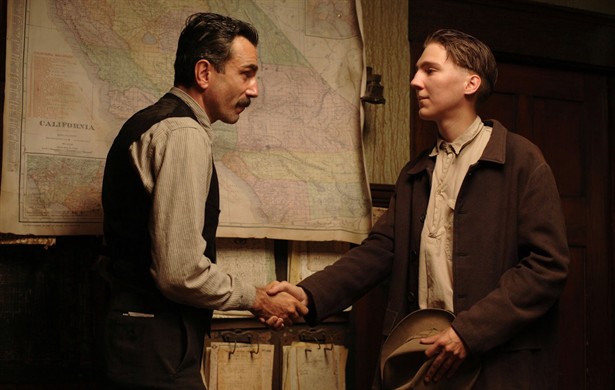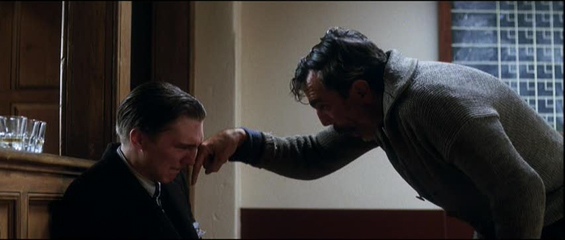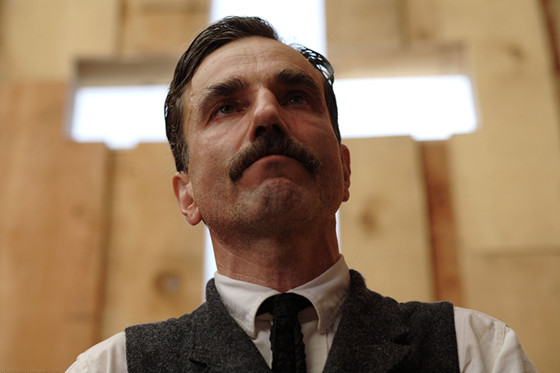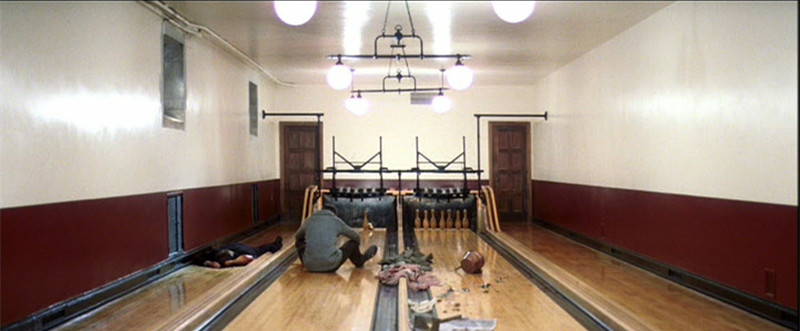6. Johnny Greenwood’s Score – Soothing in Parts, Unsettling in Others
After his initial contact with Paul Thomas Anderson, Radiohead’s Johnny Greenwood wrote hours and hours of music for the film, but in the end they tightened it to 33 minutes.
The final result almost belongs in a horror movie, alluding we should be afraid of something, yet we don’t quite know what. It soothes us one minute and unsettles us the next. The tones are often menacing and mischievous, the intimidating music perfectly suited to the man at the centre of the film.
There Will Be Blood is full of dialogue with a soundtrack free of words. The score accompanies the visuals and story beautifully, carrying the film along by filling the dialogue free gaps with music perfectly continuing the story.
7. Realism vs Spectacle
While it is very easy to label Plainview a monster, denying any humanity, Paul Thomas Anderson is always giving subtle hints and clues about characters and events that aren’t completely explained, so his audience are always left thinking and wondering about the film. By blurring these lines, the audience isn’t always entirely sure which side they should lean towards. Is Plainview a soulless monster, or is there more to him? Is Eli as naïve as he seems?
Plainview is an incredibly persuasive man who strongly believes in the power of his words, speaking almost entirely in the indicative mood throughout the film. He makes declarations rather than forming questions and will stop at nothing to achieve his ends. He has no friends, hates everyone and never tries to cover up his contempt.
Plainview openly says there is nothing worth liking in anyone; he never wants anyone else to succeed and always sees the worst in people. Eli accuses Plainview of lusting after women, but we know this isn’t the case. This is entirely a man’s world and the only pleasure Plainview craves is the pleasure he gets from succeeding and triumphing over others. Eli is supposed to be the ‘good guy’, but by the end we’re really not sure who is worse.
8. “I Drink Your Milkshake!”
This iconic analogy is arguably the film’s most quotable line.
In the year 1927, Plainview is rich, drunk and very alone, living in a mansion that seems to have everything, including a bowling alley. The sheer size of his surroundings only isolates him even more. He seems content with his circumstances, his madness as his only companion.
After a verbal altercation with Eli, where the young man doesn’t seem to understand the scope of Plainview’s influence in the oil world, he informs the preacher of the following: “If you have a milkshake and I have a milkshake and I have a straw, my straw reaches across the room and starts to drink your milkshake, I drink your milkshake! I DRINK IT UP!”
It is this analogy that is the prelude to Eli’s murder. Plainview has had enough of the preacher’s ignorance and finally decides he is not fit for this world.
9. Daniel Plainview: Portrait of an Anti-Hero
Plainview’s transfixing descent into madness is one of the most compelling portraits of an anti-hero we have seen in cinematic history. The man is entirely one-dimensional, there is no ambiguity here. Once he sets his sights on something, he gets it one way or another. He is determined and persistent and will never encounter a wasted opportunity.
His story could be likened to a car crash that keeps getting worse. Plainview is continuously descending further and further into madness. To say he is ambitious would be a gross understatement. His hands are very dirty, but it’s a non-issue for him. He is completely consumed by his will to succeed and definitely not the kind of man audiences ordinarily root for.
Most of the cause and effect throughout the film originate with characters, most notably Henry coming into Plainview’s life. The sequences we see of Henry and Plainview show a completely different side to the latter, a man who is easily comparable with a monster turns into a man who smiles, feels comfortable and at ease. They swim together and relax on the beach, talking about finding whores and getting drunk.
We almost don’t believe this is something Plainview wants to do, but he is at least content with the fact he has someone to do it with. He opens up to Henry more than we see him open up to anyone else, which is why he is left fuming when he learns Henry has been lying to him. Plainview reverts to an even more extreme version of his former self, the betrayal from Henry reaffirming his hatred for people.
Plainview is extremely black and white and never has any room to move when his morals (or lack thereof) are concerned. In 1927, HW tells his father he is moving to Mexico with Mary Sunday, whom he has just married. He wants to start his own drilling company, but instead of being happy for his son following in his footsteps, Plainview has nothing but contempt for him. In his eyes this puts them in direct competition.
Lashing out at HW, Plainview accuses him of harbouring anger and maliciousness and building up hatred over the years. Their interaction ends horribly, Plainview telling HW they’re not actually related and the only reason he adopted him was that he needed a sweet face to buy land. He finally says what we’ve known for the entire film. Paul Thomas Anderson cuts to a flashback of Plainview and HW from when he was a boy and in one of the film’s more tender moments, it is truly sad to see how far Plainview has fallen from this point.
10. There Will Be Blood
There Will Be Blood is long and calculated. By the end of the film, Plainview has accomplished everything he set out to. He acquired all the money he could dream of, lives in a mansion with all the possessions in the world and is alone, just like he always wanted.
When Eli shows up at Plainview’s mansion, he is passed out on the floor of his bowling alley.
Armed with a business proposition, Plainview sits, listening to Eli while eating a steak with his hands, his nose turned up at everything coming out of the preacher’s mouth.
Plainview tells Eli he’ll be happy to work together, under one condition; “I’d like you tell me that you are and have been a false prophet and that God is a superstition.” Plainview is as vindictive as ever and while Eli initially refuses, he eventually gives in after some bribery. Knowing exactly which buttons to press, Plainview instructs Eli to repeat himself over and over, like it’s his sermon and there is a full church of people watching him.
With every repetition, we can see the emotion stirring up more and more inside Eli and finally when he finishes Plainview mentions the proposed areas have already been drilled, rendering the business deal irrelevant. Breaking the news to Eli while chewing the meat off bones and then spitting them out, Plainview is every bit the predator,
Plainview spits venom at Eli, claiming Paul was the real prophet and that he is nothing but a fraud. Eli has absolutely nothing and is nothing more than a “sniveling ass” just like Plainview claims. “Did you think your song and dance and superstition would help you Eli? I am the third revelation, I am who the Lord has chosen, I am older and smarter than you.”
Eli pleads they’re old friends right to the very end, but one has to wonder whether he actually believes this or whether he is doing anything he can to placate the madman. After Plainview savagely beats Eli to death with a bowling pin, he finally exclaims “I’m finished!”
While this declaration could have multiple meanings, the intonation tells us that the murder of Eli hasn’t rendered Plainview’s own life finished, rather that he has finally accomplished what he set out to do since 1911. His hatred of mankind, eventually including his own son, has left him alone and mad.
The ending is not only unforgettable, but one that no one really saw coming. We knew that Plainview was descending further into madness, but no one expected a climax of such arbitrary violence, let alone in a bowling alley of all places. You’ll never look at the sport the same way.
Author Bio: Chloe completed a Bachelor of Communications (Journalism) at RMIT University, majoring in cinema studies. A world cinema enthusiast and member of the Australian Film Critics Association, she is also Reviews Editor at Film Blerg and works in Operations at Luma Pictures (www.lumapictures.com). You can also find her on Twitter – @csestajacobs.



